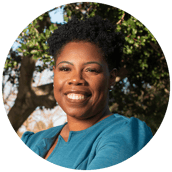During our first fireside chat, we had the opportunity to gain insights from Dr. Jennifer Brown, the Provost and Vice President of Academic Affairs at California Polytechnic University - Pomona. Dr. Brown’s diverse and varied background in higher education made for a fascinating conversation with Mentor Collective Co-Founder and CEO Jackson Boyar. We're delighted to highlight the many themes that emerged from this event on the Mentor Collective blog and uplift Dr. Brown's inspirational words.
Dr. Brown generously shared her best practices as a seasoned leader, whether AI is a threat or an opportunity for educators, how CPP is mapping resources across the seven dimensions of wellness, and her personal wellness rituals that allow her to remain present and balanced.
We’ll be sharing her thoughts across all of these topics on our blog, but felt it was best to start with one of Dr. Brown's guiding principles for her work in academic affairs – inclusive excellence.
More Access. More Opportunity.
“From my perspective, inclusive excellence means modeling the behaviors and principles you want to see and expect from your campus community. I want folks to engage in diverse and rich cultures; I want them to be respectful and have a passion for knowledge. I want them to come to one another with respectful curiosity, even when the topics at hand might be controversial.”
Dr. Brown's journey from undergrad to masters to doctorate to higher-ed leader is, without a doubt, impressive. What makes it even more inspirational, however, is her deep understanding that a successful journey doesn't mean a clear pathway. Like a modern-day reinterpretation of The Wizard of Oz, Dr. Brown shared that her academic journey took her to a variety of institutions and led her to experiences that ultimately shaped the leader she's become. Among the most influential were the mentors that guided her and reinforced a sense of belonging among her peers, academia and in higher education broadly.
 Dr. Jennifer Brown: I started out as an engineering major and found out that, I needed and wanted to do something different. I embraced the fact that I liked to help people and I like to see change. In thinking about my North Star [as a leader], and thinking back to my experiences – some of the troubles, trials and tribulations – I think about folks who are not at the table and their voices. I think about a person who can lead with integrity. That's my North Star. I want to leave places better than how I found them. I think of myself as a change maker and that access to education changes lives. How can I provide more access, more opportunity?
Dr. Jennifer Brown: I started out as an engineering major and found out that, I needed and wanted to do something different. I embraced the fact that I liked to help people and I like to see change. In thinking about my North Star [as a leader], and thinking back to my experiences – some of the troubles, trials and tribulations – I think about folks who are not at the table and their voices. I think about a person who can lead with integrity. That's my North Star. I want to leave places better than how I found them. I think of myself as a change maker and that access to education changes lives. How can I provide more access, more opportunity?Inclusive Excellence
In addition to a commitment to access and equity-minded strategies for student success, Dr. Brown leads with what she calls "inclusive excellence;" a philosophy that means modeling the leadership behaviors and principles she would like to see within a campus community and maintaining a respectful curiosity in all discourse.

Discover More Insights from the Full Fireside Chat with Mentor Collective Co-Founder Jackson Boyar
Learn more about Dr. Jennifer Brown's Role at Cal Poly Pomona
Mentor Collective is a proud partner of Cal Poly Pomona's Bronco Navigators peer mentorship program. To learn more about how your institution can centralize mentorship and provide timely access to critical campus resources via peers and alumni, contact us for a consultation tailored to your institutions goals.